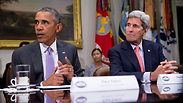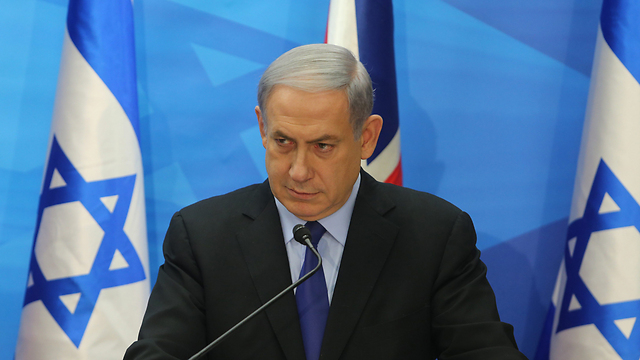
Obama and Kerry. The battle has ended with a victory for the president and his policy
צילום: AP
US Jews can support both Israel and the Iran deal
Op-ed: After holding a serious, open discussion on the world powers' nuclear agreement with Iran, America's Jews clearly support President Obama's stand and most Jewish Congress members will vote in favor of the agreement.
Last week, the American House of Representatives began its discussions ahead of the vote on the Congress' support for the world powers' agreement with Iran to prevent it from acquiring a nuclear weapon. The support of 41 Democratic senators guarantees that it will not only be impossible to overcome a presidential veto in favor of the agreement, but that there will likely be no need to impose the veto. The battle, therefore, has ended with a victory for President Barack Obama and his policy.

The Jewish community in the United States has been at the center of the discussion on the agreement with Iran since the agreement was signed in Vienna, following the campaign led by Prime Minister Benjamin Netanyahu against the agreement and his attempt to gain the support of the community leaders and institutions.
Netanyahu gave America's Jews an alleged dichotomic choice between being loyal to Israel (in other words, opposing the agreement) and being loyal to the US president (in other words, supporting the agreement), but the Jewish community members did not fall into the trap.
US Secretary of State John Kerry discusses the Iran nuclear agreement (Video: Reuters) (צילום: רויטרס)
The Jewish community in the US held a serious, open discussion, filled with arguments from both sides, on the issue of the Iranian nuclear program, which is a fateful matter for Israel's security. It's a shame that such a discussion was not held in Israel.
The following questions were asked - and answered - in the synagogues, community centers and around dinner tables across the US: Is an agreement better than no agreement? Does the agreement achieve the goal of neutralizing Iran's ability to produce a nuclear bomb? Will the agreement have a moderating effect on the region? Will it contribute to the security of the US and Israel?
I am certain that both those who chose to support the agreement and those who chose to oppose it saw the security of Israel and the US before their eyes.

Netanyahu gave America's Jews an alleged dichotomic choice between being loyal to Israel and being loyal to the US president (Photo: Alex Kolomoisky) (צילום: אלכס קולומויסקי)
The result is that US Jews clearly support President Obama and the agreement. In the final count, most Jewish Congress members will vote in favor of the agreement. Public opinion polls point to a majority of supporters among the Jewish community, and the one of the expressions of support was a letter signed by 440 rabbis.
In their support for the agreement, US Jews considered the professional opinion of hundreds of nuclear and national security experts, ambassadors and American public figures who also support the agreement. Some Israeli security experts and intelligence assessments see the agreement as positive as well and argue, unequivocally, that it is the best chance to stop the Iranian nuclear program and that it could have positive effects on the entire region, including deterring Iran from committing terror attacks for the purpose of intimidation.
Finally, US Jews considered the criticism voiced by Israeli politicians against the prime minister's destructive public interference in American politics. The ramifications of such meddling are more dangerous and destructive than the nuclear danger itself, as it could harm the core of Israel's special relations with the US.
One of the challenges created by the discussion on the Iranian nuclear agreement is the fact that the argument focuses on the political lines - in other words, between the two parties. However, the future of Israel's relations with the US, it is crucial, however, to position the Jewish community which supports Israel on both sides of the American political map.
Yael Patir is the director of the Israel Program at J Street.











